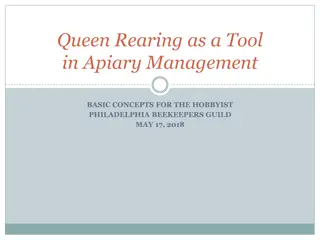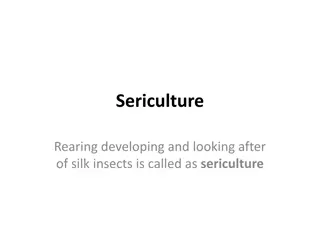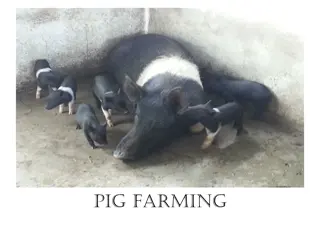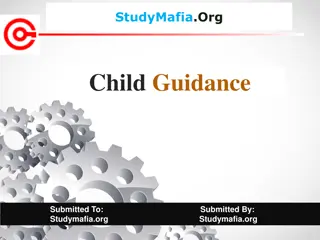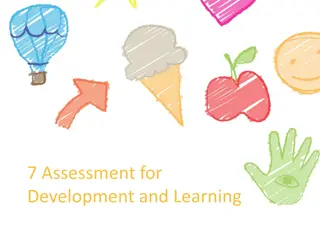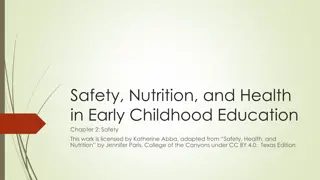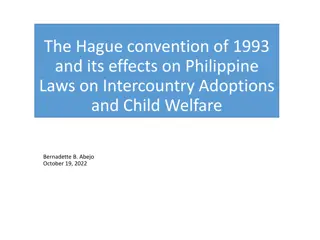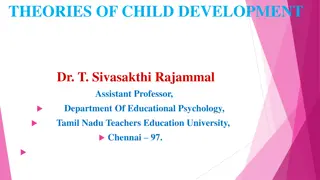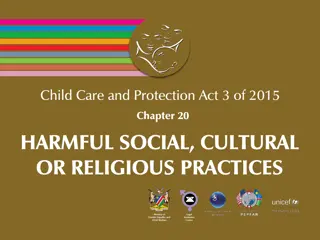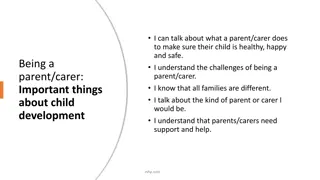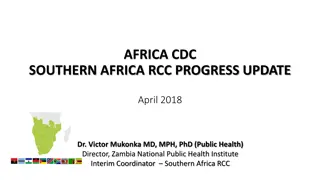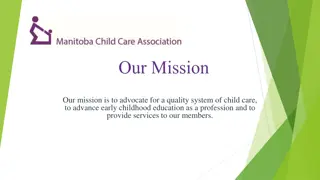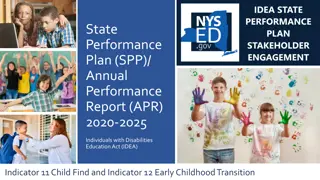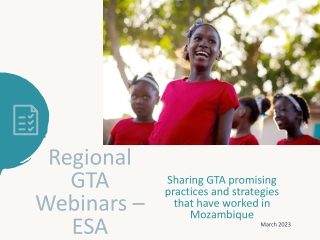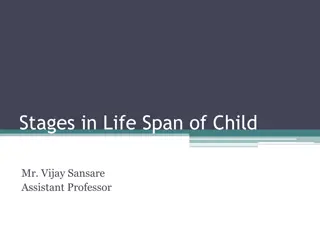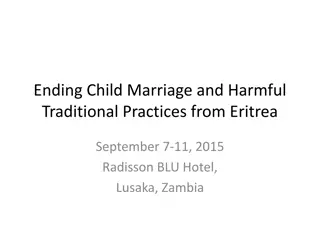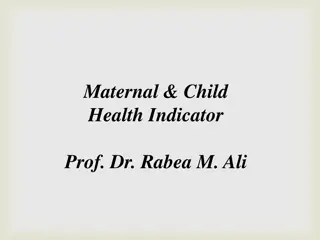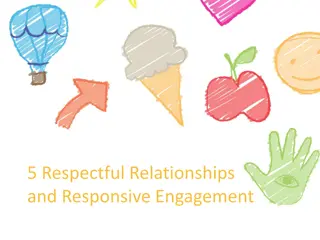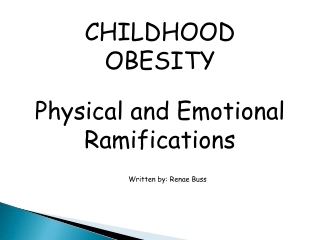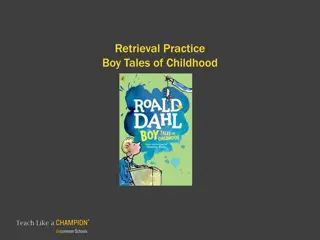Childhood Development and Child Rearing Practices in Africa
This comprehensive presentation covers the normal development of a child including areas of development, milestones, stages, and factors affecting development. It also delves into child rearing practices in Africa, highlighting both positive and negative aspects. The aim is to understand childhood development and various influencing factors in the African context.
Download Presentation

Please find below an Image/Link to download the presentation.
The content on the website is provided AS IS for your information and personal use only. It may not be sold, licensed, or shared on other websites without obtaining consent from the author. Download presentation by click this link. If you encounter any issues during the download, it is possible that the publisher has removed the file from their server.
E N D
Presentation Transcript
NORMAL CHILDHOOD DEVELOPMENT AND CHILD REARING PRACTICES IN AFRICA By OVIE ORUAH-UREKI 7THJUNE 2023
OUTLINE OBJECTIVES Childhood development Areas of development Developmental milestones Developmental stages Factors affecting development Child rearing practices in Africa Conclusion Refrences
OBJECTIVES To understand the normal development of a child and some of the factors that can affect it To know some of the child rearing practices (both positive and negative).
CHILDHOOD DEVELOPMENT DEVELOPMENT - It is the process of functional and physiological maturation of an individual. It is progressive increase in skill and capacity to function. It is related to maturation and myelination of the nervous system. It includes psychological, emotional and social changes.
Areas of Development Physical development - refers to strength and physical skills. Cognitive development - involves thinking and problem-solving. Language development - refers to communication and understanding. Social-emotional development - affects how children interact with others and process feelings.
DEVELOPMENTAL MILESTONES Developmental milestones are the behaviors that mark stages of typical growth. Children all develop at their own pace. Neck control Social smile Sitting with and without support Crawling Standing with and without support Walking Ability to imitate Speaking in sentences
DEVELOPMENTAL STAGES Birth to 18 months: During this time, children learn to identify familiar people, or respond to facial expressions. They may also learn a few words, and stand and walk on their own. 18 months to 3 years: Children may start playing pretend games, playing with other children or following two-part directions. They may say the names of familiar people, throw balls or run. 3 to 5 years: At this age, children start naming their likes and dislikes, learn to count to 10 and identify colors. They may recite nursery rhymes, know their name and address, and play on a playground on their own.
DEVELOPMENTAL STAGES Contd 5 to 12 years: In grade school, children grow their problem-solving skills and confidence. They may build close friendships, develop personal interests and increase their reading skills. 12 to 18 years: Adolescents gain increasing levels of independence. They generally develop their own opinions, go through puberty and become interested in dating and sexuality.
FACTORS AFFECTING GROWTH AND DEVELOPMENT GENETIC FACTORS Down syndrome, fragile X syndrome, Angelman syndrome. PRENATAL FACTORS - Maternal malnutrition, toxins such as alcohol or lead poisoning maternal infection (TORCHES), substance abuse, illness POST NATAL Nutrition, childhood illness, physical environment, psychological environment , culture, socio economic status, play and exercise.
THEORIES OF PSYCHOLOGICAL DEVELOPMENT Nature vs Nuture Genetics vs Environment Active vs Passive Active vs Passive Continuity vs Discontinuity Change occurs gradually Change occurs abruptly
Sigmund Freud stages of child development.
ERICK ERICKSON PSYCHOSOCIAL STAGES
CHILD REARING PRACTICES IN AFRICA Child rearing practices are as old as humanity. Effective child-care practices play a vital role in children s growth, brain development, personality enhancement and health promotion. In most parts of Africa, child-rearing practices are highly influenced by the traditional norms and values. Child-rearing practices in Africa are diverse and vary greatly depending on the cultural and ethnic group.
POSITIVE CHILD REARING PRACTICES 1. Extended family: In many African societies, the extended family plays a significant role in raising children. Children are often raised by their parents, grandparents, aunts, uncles, and other relatives. This allows for the sharing of resources and responsibilities, and helps to strengthen family bonds
POSITIVE CHILD REARING PRACTICES Contd Community involvement: In many African societies, the community is involved in the upbringing of children. This can include neighbours, friends, and other members of the community who offer support and guidance to parents and children. Most times children are not left alone without supervision
POSITIVE CHILD REARING PRACTICES Contd Oral tradition: In many African societies, the passing down of knowledge and traditions is done through oral storytelling. This includes teaching children about their culture, history, and values and it helps to build good attitude in them, fosters bonding among them and their peers.
POSITIVE CHILD REARING PRACTICES Contd Respect for elders: Respect for elders is an important value in many African societies. Children are taught to show respect for their elders and to listen to their advice and guidance.
CONTROVERSIAL PRACTICES Gender roles: Traditional gender roles are still prevalent in many African societies, with women often responsible for childcare and household chores, while men are the primary providers. Discipline: Discipline is an important aspect of child-rearing in many African societies. However, the type of discipline varies greatly depending on the culture and may range from non-violent methods such as verbal reprimands or time-outs to physical punishment.
NEGATIVE PRACTICES CORD CARE - In rural Africa, due to a lack of accessible, affordable and quality health care services, home deliveries are preferred over hospital deliveries and are carried out by Traditional Birth Attendants or mothers in laws, who are not trained. A baby s birth the cord is cut with unsterilized blades or knives, and many a times cow dung or ash is applied on the baby s cord for healing purpose. . These practices set many newborns up for neonatal tetanus and serve as contributing factor for child mortality.
Practices Concerning Weaning/Diet In various parts of Africa, the introduction of a weaning diet is either too early or too late, which holds the risk of contributing to the child s malnutrition. Some studies have shown that cultural beliefs and taboos affect the weaning in a majority of the cases. Various nutritious foods are not given to the infant in the mistaken belief that they would make children to steal.
Practices Concerning Weaning/diet Foods like meat and eggs are considered as foods that could cause and foods like snail is believed to make them slow fruits, mangoes are considered as foods that hold characteristics of causing flu and pneumonia. Children during early ages are deprived of nutritious foods that are required for growth and development.
FEMALE GENITAL MUTILATION In some African cultures, female genital mutilation (FGM) is also considered a traditional practice. FGM involves the partial or total removal of the female genitalia, and it is often carried out on young girls. This practice can have serious negative health consequences for the child and can lead to long- term physical and psychological problems.
CHILD MARRIAGE AND DELIVERY Another negative child-rearing practice in Africa is child marriage, which is the practice of marrying off young girls to older men. Child marriage is prevalent in some African countries, and it can have serious negative consequences for the physical, emotional, and social development of the child. They also have young girls becoming mothers at a very young age.
CONCLUSION Development of a child is a complex interplay from when the child is conceived through pregnancy to the environment Child rearing practices in Africa especially the positive ones should be encouraged
REFERENCES Collins wa, ed. 1984. introduction development during childhood. www.wkipidia.com/development in children. Omoaregab JO, Theories of psychological development. Child Rearing Practices in Africa, Kenpro, January 2013. Porter G, Kate H, Michael B, et al. Children as Research Collaborators: Issues and Reflections from a Mobility Study in Sub-Saharan Africa. American Journal of Community Psychology 46.1 2 (2010): 215 227



